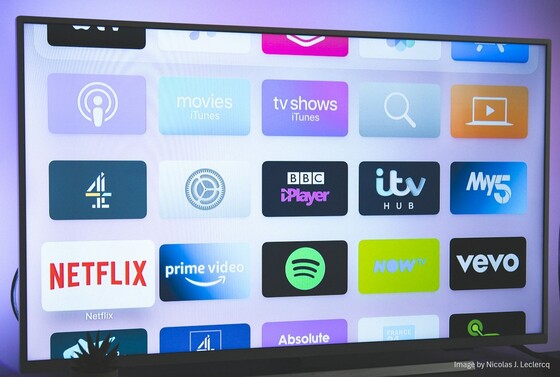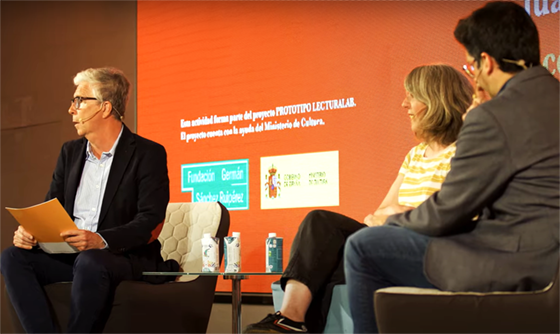Audience development for book reading from TV experiences
One of the most important facts in the content marketing worldwide has been the raise of the TV streaming platforms. We are living in an era ruled by visual media in general terms, but the role of television in influencing cultural trends and behaviours is very powerful, especially among the younger generations.
Television shows share with the classic literature their ability to captivate audiences through compelling narratives and characters. This similarity could represent a unique chance to promote the habit of reading books.
The Fundación Germán Sánchez Ruipérez has been working in different research and experimental projects trying to leverage TV shows as a valuable asset in encouraging book reading among viewers.
Television remains one of the most widespread forms of entertainment globally, reaching millions of viewers across diverse demographics. One of the reasons is rooted on the fact that those shows span various genres and themes, satisfying to different interests and preferences.
One of the most interesting facts that FGSR found in research with teenagers was that many of them declared that TV shows “promote reading” through adaptations of some kind of books (popular genres as fantasy, historic recreations or romance). This is a process that works in two directions: the TV show promotes the books, and the book fans love to watch the TV adaptations. When a beloved novel is adapted into a television series, it generates interest among viewers who may not have been familiar with the original work. Examples such as “Game of Thrones,” based on George R.R. Martin’s books, or “Bridgerton,” adapted from Julia Quinn’s novels, have stimulated increased book sales and renewed interest in the literary source material.
Television offers an opportunity to showcase a diverse range of literary genres and authors. From crime thrillers to historical dramas, fantasy epics to romantic comedies, each TV show introduces viewers to different storytelling styles and narrative techniques. The interesting fact is that could be very likely that by featuring a variety of genres, television would encourage viewers to explore books that align with their newfound interests, thereby broadening their reading horizons.

Furthermore, some well-developed characters are a strong hallmark of successful television shows and their audiences often become emotionally invested in these characters’ journeys and motivations. When viewers are very interested by a character on screen, they may be inspired to delve deeper into the character’s backstory or explore related literary works that provide additional insights.
So there is an attachment to the story or their characters that triggers the curiosity so much that the viewers could be willing to discover more by spinoffs, expanded versions or, simply, in a text reading way that may provide a deeper and longer experience.
Television shows have a significant role to play in promoting reading books by introducing audiences to compelling stories, diverse genres, and memorable characters. Through adaptations, genre diversity, character depth, educational value, and cross-media promotion, TV shows can inspire viewers to discover the richness of literature beyond the screen. By capitalizing on the storytelling power of television, we can cultivate a culture where reading books becomes not only a pastime but a cherished and enriching experience for viewers of all ages.
From the industry point of view, it doesn’t seem surprising if anyone propose to forge partnerships between publishers, authors, and TV platforms to maximize promotional reach and impact.
There are already effective promotion strategies leverage the synergy between television and other media platforms and it is proof that alliances between publishers, authors, and TV producers can amplify promotional efforts, reaching a wider audience.
One experimental initiative
As audiovisual content may have the potential to educate and enrich viewers’ understanding of the world by adapting culturally significant books, it made a lot of sense to explore the opportunities for reading promotion. If viewers who are drawn to these narratives may look for books that offer more in-depth exploration and context, one interesting experimental approach would be to transfer information and resources to those professionals working to promote reading (in libraries, schools or other cultural institutions).
The FGSR has been working for a year on a project called “Lecturalab Prototype”, which consists of the design of lines of work to promote reading based on unusual approaches.
Within the framework of what has been called “reading R&D” it is about experimenting with innovative prototypes and evaluating whether they can be useful in the field of professional or vocational promotion of reading. One of these essays has focused on the work and dialogue between reading professionals and people who operate in the world of television series and audiovisuals.

The origin of this approach is the confirmation in the latest qualitative studies of the FGSR – especially in the case of the one dedicated to the perceptions of adolescents about reading – of the possible synergy between the interest in narratives that are developed in audiovisual content (usually as TV platform series). The interest on a TV narrative fosters a deeper engagement with storytelling beyond the confines of the TV screen.
These research activities are supported by grants from the Ministry of Culture, through the General Directorate of Books, Comics and Reading.
The culmination of this process took place in a conference held in June at Casa del Lector – the FGSR centre in Matadero / Madrid – with the presentation of ideas around these possibilities of use. The audience was made up of professionals who promote reading.
The professor of Language and Audiovisual Narrative at the Pontifical University of Salamanca, Pedro Sangro, carried out a reflection on the tools that literature can export from language and audiovisual narrative to provide the reader with an emotional experience like that of the viewer.
On the other hand, the director of the Master of Fiction Screenwriting for Film and TV at the Pontifical University of Salamanca, Juan Medina, developed a presentation on “Expanded universes and intertwined stories: exogamy of fictional sagas”, to explain the impact of the transfers between audiovisual and literary franchises, reviewing the possibilities of creative expansion audiovisual-literature / literature-audiovisual.
To finish the part dedicated to presentations and conferences, both professors spoke with Amaya Muruzábal, creator of the Amazon series “Reina Roja”, to analyze the adaptation of the literary work to the series format, as well as the synergies and divergences between the fictional universes. of both works.
In the afternoon session, a workshop was held by Sergio Barrejón – consistent screenwriter, director and audiovisual producer – consisting of devising a short film script combining an observation activity on the street with a passage-character-place extracted of a novel.

















